
Queen Elizabeth II owned a historic collection of jewels – some as monarch and others as a private individual. They are separate from the gems and jewels of the Royal Collection, and from the coronation and state regalia that make up the Crown Jewels.

The wedding of Prince Albert, Duke of York and Lady Elizabeth Bowes-Lyon took place on 26 April 1923 at Westminster Abbey. The bride was a member of the Bowes-Lyon family, while the groom was the second son of King George V.

On 6 July 1893, Prince George, Duke of York, and Princess Victoria Mary of Teck were married at the Chapel Royal, St. James's Palace, in London, England.

The wedding dress of Princess Elizabeth was worn at her wedding to Philip Mountbatten, Duke of Edinburgh on 20 November 1947 in Westminster Abbey. Given the rationing of clothing at the time, she still had to purchase the material using ration coupons. The dress was designed by Norman Hartnell. Hartnell's signature was said to be embroidery, and he enjoyed "working with soft, floating fabrics, particularly tulle and chiffon, and with plain, lustrous silks". The dress was made of Chinese silk, with a high neckline, tailored bodice and a short train. Without straps and with long sleeves, it provided a "fit and flare silhouette".
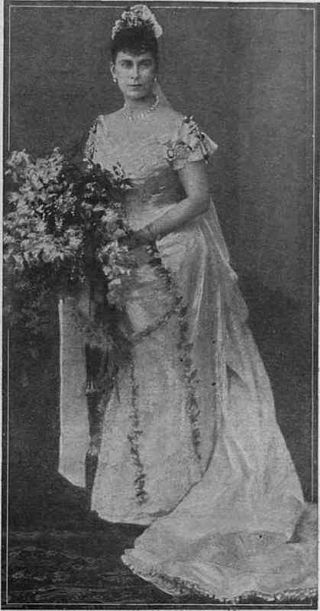
The wedding dress of Princess Victoria Mary of Teck is the gown worn by the future Queen Mary at her wedding to Prince George, Duke of York on 6 July 1893 at the Chapel Royal, St. James's Palace, in London. The dress now belongs to the British Royal Collection and is part of a collection of royal wedding dresses at Kensington Palace in London.
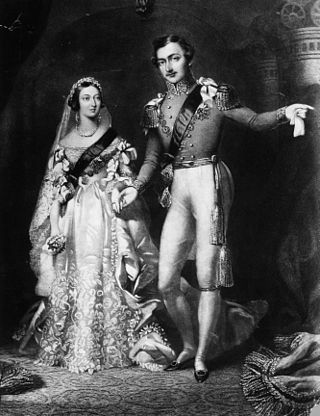
Queen Victoria of the United Kingdom married Prince Albert of Saxe-Coburg and Gotha on 10 February 1840. She chose to wear a white wedding dress made from heavy silk satin, making her one of the first women to wear white for their wedding. The Honiton lace used for her wedding dress proved an important boost to Devon lace-making. Queen Victoria has been credited with starting the tradition of white weddings and white bridal gowns, although she was not the first royal to be married in white.

The wedding dress of the American actress Grace Kelly, worn during her wedding to Prince Rainier III of Monaco on 19 April 1956, is cited as one of the most elegant and best-remembered bridal gowns of all time, and one of the most famous since the mid 20th century. One author describes the dress as a symbol of "the marital fervor" and a major influence on women who strove to "emulate Kelly's peau de soie and lace masterpiece". It was designed by Helen Rose of MGM. The dress consisted of a bodice with an attached under-bodice and skirt support. There were two petticoats, one being an attached foundation. The wedding attire included a headdress, veil, shoes and the lace- and pearl-encrusted prayer book which she carried down the aisle. To celebrate the 50th anniversary of the wedding, the Philadelphia Museum of Art displayed it at the museum between 1 April and 21 May 2006 and reported it to have been arguably its most popular exhibit.

On the event of her wedding to Prince Henry of Battenberg at Saint Mildred's Church at Whippingham, near Osborne, on 23 July 1885, Princess Beatrice of the United Kingdom wore a wedding dress of white satin, trimmed with orange blossom and lace, the lace overskirt held by bouquets of the blossom entwined with white heather. There was lace on the pointed neck line, and on the sleeves, for the Princess was a lover of, and an expert on, lace. One of her most treasured possessions was a tunic of old point d'Alençon which had belonged to Catherine of Aragon. Knowing her daughter's love of lace, the Queen allowed Princess Beatrice to wear the Honiton lace and veil which she herself had worn on her wedding day. It was a very precious possession to the Queen, and Princess Beatrice was the only one of her daughters to be given the opportunity to wear it. Her veil was emblazoned with a diamond circlet with diamond stars, a wedding gift from her mother.

The wedding dress of Princess Louise Margaret of Prussia was worn by her at her wedding to Prince Arthur, Duke of Connaught and Strathearn, at St. George's Chapel, Windsor, on 13 March 1879. Prince Arthur was the seventh child and third son of Queen Victoria and Prince Albert of Saxe-Coburg and Gotha.

Princess Helena, the fifth child and third daughter of Queen Victoria, wore a dress of white satin featuring deep flounces of Honiton lace, the design of which featured roses, ivy, and myrtle, for her marriage to Prince Christian of Schleswig-Holstein on 5 July 1866 at Windsor Castle, Windsor, Berkshire, England. Her headpiece was composed of orange blossom and myrtle, and the veil was also made of Honiton lace. She also wore a necklace, earrings, and brooch of opals and diamonds, a wedding gift from the Queen. Along with bracelets set with miniatures, Helena also wore the Order of Victoria and Albert.
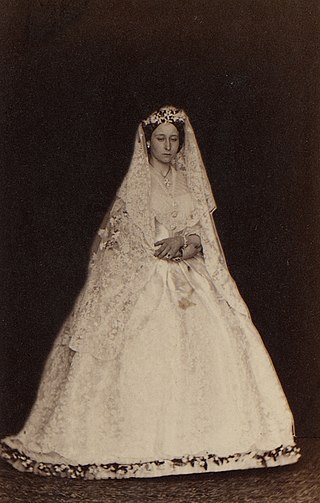
The wedding dress of Princess Alice of the United Kingdom was worn during a period of court mourning for the death of her father.
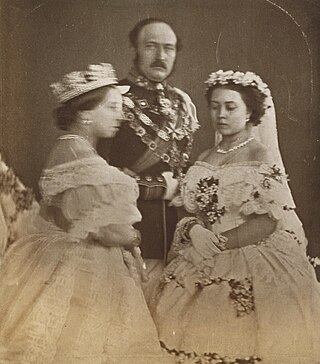
The wedding dress of Victoria, Princess Royal, was worn by the eldest daughter of Queen Victoria in 1858.

The wedding dress of Princess Helen of Waldeck and Pyrmont was worn by the bride at her wedding to Prince Leopold, Duke of Albany, on 27 April 1882 in St. George's Chapel, Windsor Castle. Prince Leopold was the youngest son of Queen Victoria and Prince Albert. Princess Helen was the daughter of George Victor, Prince of Waldeck and Pyrmont and his wife Princess Helena of Nassau.

The wedding dress of Princess Louise, Queen Victoria's sixth child and fourth daughter, was worn by her at her wedding to John Campbell, Marquess of Lorne, the heir-apparent to the 8th Duke of Argyll, on 21 March 1871 at St. George’s Chapel, Windsor Castle.

The wedding of Queen Victoria of the United Kingdom and Prince Albert of Saxe-Coburg and Gotha took place on 10 February 1840 at Chapel Royal, St. James's Palace, in London.
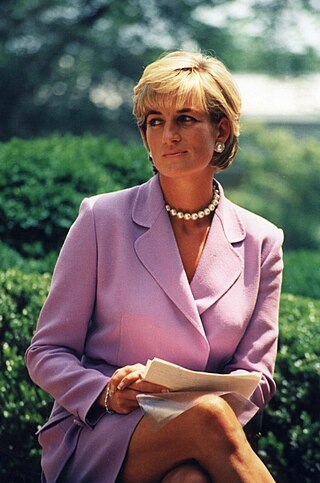
Diana, Princess of Wales, owned a collection of jewels both as a member of the British royal family and as a private individual. These were separate from the coronation and state regalia of the crown jewels. Most of her jewels were either presents from foreign royalty, on loan from Queen Elizabeth II, wedding presents, purchased by Diana herself, or heirlooms belonging to the Spencer family.

The wedding dress of Princess Maud of Wales was worn at her wedding to Prince Carl of Denmark on 22 July 1896 in the Private Chapel at Buckingham Palace. Maud was the youngest daughter of Albert Edward, Prince of Wales and Alexandra, Princess of Wales; Carl was the second son of Crown Prince Frederick and Crown Princess Louise of Denmark.

The wedding of Princess Mary, and Henry Lascelles, Viscount Lascelles took place on Tuesday, 28 February 1922, at Westminster Abbey. The bride was the only daughter of King George V, while the groom was a member of the Lascelles family.

The wedding of Rainier III, Prince of Monaco, and Grace Kelly, took place on 18 and 19 April 1956 at the Prince's Palace of Monaco and the Saint Nicholas Cathedral. The groom was the sovereign prince of the Principality of Monaco. The bride was an American film star.
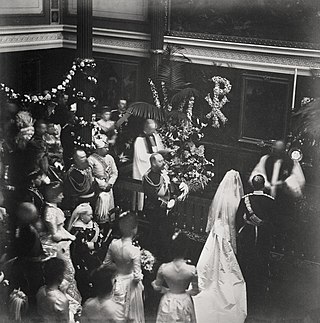
On the event of her wedding to Alexander Duff, Earl of Fife at the Private Chapel of Buckingham Palace in London on 27 July, 1889, Princess Louise of Wales wore a wedding dress of white satin, trimmed with lace and orange flowers with a bridal veil. The dress was distinguished by a high v-shaped Medici collar. Louise carried a bouquet of orange flowers. The author of the report of the wedding in the Court Circular column of The Times wrote that "In truth, there is here little room for description other than technical, since every bride has the appearance of a vision of pure white". Louise's bridesmaids wore simple pink dresses with knots of roses in their hair.





















